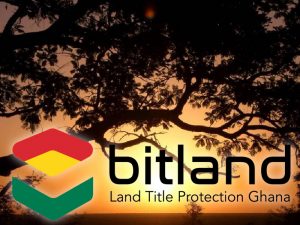
Decentralized land registry project Bitland has announced its ICO crowdfunding campaign and slated launch following a partnership with Danish exchange OpenLedger and revamped “decentralized conglomerate” CCEDK.
Bitland: Development Project Has ‘Many Aspects’
Bitland (bitland.world), which seeks to secure rights for landowners by using the blockchain to bypass corruption and other hurdles, made the announcements in a press release this week.

“[This may be the] last chance for the public to enjoy becoming a part of something that may well turn into a historic event creating the foundation for blockchain based innovation,” CCEDK and OpenLedger CEO Ronny Boesing said.
The crowdsale is being handled in conjunction with CCEDK’s ICOO asset, while OpenLedger is also involved in building the voting system.
The platform will be “built on Bitshares’ MIT-licensed Graphene 2.0 blockchain technology, a key component of the system through which land title transactions will be stored,” the release states.
 A blockchain-based solution to the slow pace of change in land registry, as West African countries become more economically advanced, appears to be a natural fit.
A blockchain-based solution to the slow pace of change in land registry, as West African countries become more economically advanced, appears to be a natural fit.
After its intended launch in Ghana in October, Bitland is looking to expand to Nigeria at the start of 2017.
“Bitland is not only involved in land title registration. We have many other elements to our development project,” Bitland CEO Chris Bates said. “We are actively preparing to pilot various facets of this program in different regions.” (Bates originally spoke to Bitcoin.com at length about the project in May this year.)
Confidence in Blockchain
Boesing meanwhile remains buoyant about the financial potential for clarifying the murky landscape, which has dogged progress in the target countries for decades. He said:
Bringing clarity to land ownership rights will not only reduce corruption, but will also open up trillions of dollars in locked capital, since land that does not have a functional title cannot be used as capital.
 Blockchain registration concepts, meanwhile, have come thick and fast in the past couple of years. In developed markets as well, outfits such as uBITquity are attempting to both simplify ownership procedures and minimize the chances of foul play for everything from real estate to the land it is built on.
Blockchain registration concepts, meanwhile, have come thick and fast in the past couple of years. In developed markets as well, outfits such as uBITquity are attempting to both simplify ownership procedures and minimize the chances of foul play for everything from real estate to the land it is built on.
“One of the benefits of installing different pilots is that each individual case-study can address the concerns of each location’s diverse array of demands that can be met with simultaneous protocol testing,” Bates added.
